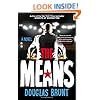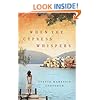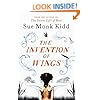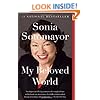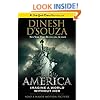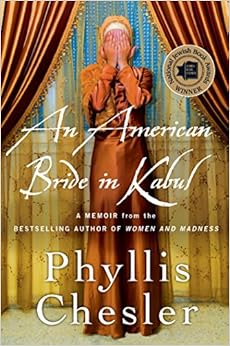
An American Bride in Kabul: A Memoir
and over one million other books are available for Amazon Kindle. Learn more


Flip to back
Flip to front

An American Bride in Kabul: A Memoir Paperback – October 7, 2014

$12.71
FREE Shipping on orders over $35.
Only 3 left in stock (more on the way).
Ships from and sold by Amazon.com.
Gift-wrap available.
NO_CONTENT_IN_FEATURE
Start reading An American Bride in Kabul: A Memoir on your Kindle in under a minute.
Don't have a Kindle? Get your Kindle here, or download a FREE Kindle Reading App.
Don't have a Kindle? Get your Kindle here, or download a FREE Kindle Reading App.
Browse in Books with Buzz and explore more details on selected titles, including the current pick, "Neil Patrick Harris: Choose Your Own Adventure," an engaging, interactive dive into the versatile actor's life (available in hardcover and Kindle book).
Product Details
Would you like to update product info or give feedback on images?.
|
Editorial Reviews
From Publishers Weekly
In 1961 renowned feminist, professor, and psychotherapist Chesler was as a young, intellectually curious Jewish woman intent on rebellion and freedom. She envisioned her marriage to a man she met in college, a Westernized Muslim from a wealthy Afghani family, as a romantic adventure filled with travel and intellectual pursuits; however, their visit to Afghanistan quickly turned into a living nightmare as Chesler became confined to the harem at his luxurious family compound. My unexpected house arrest was not as shocking as was my husband's refusal to acknowledge it as such, Chesler writes. The author divides her engrossing memoir into two sections: her time as a young bride living with of one the wealthiest families in Afghanistan and struggling to return to the United States, and her husband's attempts to force her return to Afghanistan. Chesler candidly relates her continuing friendship with her former husband and his family over the last 50 years, detailing how life in Afghanistan forged her feminist perspective and how 9/11 altered the original focus of the memoir. Chesler adroitly blends her personal narrative with a riveting account of Afghanistan's troubled history, the ongoing Islamic/Islamist terrorism against Muslim civilians and the West, and the continuing struggle and courage of Afghan feminists. Agent: Jane Dystel, Dystel and Goderich. (Oct.)
--This text refers to the
Hardcover
edition.
From Booklist
Second-wave feminist Chesler delves into her past with this memoir detailing her long-ago marriage to an Afghan man and the months spent with his family in Kabul. To her credit, Chesler, who is Jewish, focuses less on a bitter recounting of a disastrous marriage than on her 1961 diary, which reveals the clash of cultures that ensued upon her arrival. She had no reason to suspect that her urbane young husband would so easily relinquish his Western ideals to Muslim traditions once he returned home. Chesler was relegated to harem life and now shares the harsh realities of gender separation and the pervasive dullness of isolation. She was mortified by routine cruelties and the anti-intellectualism encouraged among women and children. After nearly dying, Chesler was sent home by her benevolent and powerful father-in-law. Divorced, she began a new life. Though her inclusion of her political opinions about Israel and the Palestinians bogs down the narrative, Chesler’s personal story is fascinating, and her insights on women’s lives in Afghanistan are certainly worth reading. --Colleen Mondor
--This text refers to the
Hardcover
edition.
More About the Authors
Discover books, learn about writers, read author blogs, and more.Customer Reviews
Most Helpful Customer Reviews
73 of 78 people found the following review helpful
By
Bee
VINE VOICE on August 12, 2013
Format: Hardcover
Vine Customer Review of Free Product
(
What's this?
)
10 Comments
Sending feedback...
As a memoir, this book left me baffled and somewhat annoyed. As an examination of the treatment of females in Afghanistan and many other Muslim countries, this book serves as an important reminder of the horrors of their plight and the challenges of trying to facilitate change.
The book is marketed as a memoir, but those looking for a lot of detail and insight should be warned that little is offered. I was hoping to learn about the experience of a young New York Jewish woman marrying an Islamic man and moving with him to Afghanistan. I was disappointed to discover that Chesler provides little detail about her own experience, and no context for understanding the decisions she made. (She still seems bewildered by her feelings and behavior, even 50 years later.) There is essentially no description of her life before she met Abdul-Kareem, other than the mention that she grew up in an Orthodox Jewish family. No information is shared about her own family-of-origin, which I found perplexing, especially given her training as a psychotherapist. I learned much more about her early years and her family from the brief Wikipedia entry than from her memoir.
The story starts with her courtship and marriage, and it quickly moves to her ordeal living with his extended family in Kabul. (I gather that she was there only a few months.) She says he became a different person in Afghanistan; his treatment of her ranged from neglect to abuse. Throughout the book, she tries to come to terms with her husband's transformation. I found it quite shocking that a woman who devoted her career to feminism could rationalize so much of her husband's misogynistic behavior as culturally inevitable and therefore somehow not his fault.Read more ›
The book is marketed as a memoir, but those looking for a lot of detail and insight should be warned that little is offered. I was hoping to learn about the experience of a young New York Jewish woman marrying an Islamic man and moving with him to Afghanistan. I was disappointed to discover that Chesler provides little detail about her own experience, and no context for understanding the decisions she made. (She still seems bewildered by her feelings and behavior, even 50 years later.) There is essentially no description of her life before she met Abdul-Kareem, other than the mention that she grew up in an Orthodox Jewish family. No information is shared about her own family-of-origin, which I found perplexing, especially given her training as a psychotherapist. I learned much more about her early years and her family from the brief Wikipedia entry than from her memoir.
The story starts with her courtship and marriage, and it quickly moves to her ordeal living with his extended family in Kabul. (I gather that she was there only a few months.) She says he became a different person in Afghanistan; his treatment of her ranged from neglect to abuse. Throughout the book, she tries to come to terms with her husband's transformation. I found it quite shocking that a woman who devoted her career to feminism could rationalize so much of her husband's misogynistic behavior as culturally inevitable and therefore somehow not his fault.Read more ›
Thank you for your feedback.
If this review is inappropriate, please let us know.
Sorry, we failed to record your vote. Please try again
56 of 60 people found the following review helpful
By
B. McEwan
TOP 1000 REVIEWERVINE VOICE on August 14, 2013
Format: Hardcover
Vine Customer Review of Free Product
(
What's this?
)
1 Comment
Sending feedback...
I have been an admirer of Phyllis Chesler for a long time. An icon of Second Wave Feminism, I first noticed Chesler when she wrote a book called Women and Madness, which presented credible evidence for a grossly unjust double standard when it comes to assessments of women's mental health in comparison to that of men. Basically, Chesler convincingly shows that when women don't behave as men expect -- as our assigned gender roles dictate -- men decide that we crazy and lock us up in mental hospitals. Certainly, things have improved since Chesler wrote the original book 30 years ago, but this sort of oppression is still a problem and it was completely unrecognized before Chesler's pioneering work.
But that's another story. In this book, Chesler reveals something surprising about herself. She, foolishly it turned out, married an Afghan national when she was a young college woman, and went with him to his native Afghanistan. Once there, her husband turned into another person altogether, expecting Chesler to convert to Islam and become a compliant, burka-wearing wife. While she developed a deep regard for the landscape and its historical importance, she also developed a deep mistrust of her husband and his family. She was essentially a prisoner in "purdah," a term that refers to the drastic separation of women from the world. She lived cut off from everyone except the other women in her family, including the three wives of her polygamous father-in-law, who ruled the roost with an iron hand. She nearly starved, then contracted hepatitis, was forcibly impregnated by her husband and denied medical care. It's amazing she survived. Chesler's descriptions of that time and place in her life are at once oddly lyrical and chilling.Read more ›
But that's another story. In this book, Chesler reveals something surprising about herself. She, foolishly it turned out, married an Afghan national when she was a young college woman, and went with him to his native Afghanistan. Once there, her husband turned into another person altogether, expecting Chesler to convert to Islam and become a compliant, burka-wearing wife. While she developed a deep regard for the landscape and its historical importance, she also developed a deep mistrust of her husband and his family. She was essentially a prisoner in "purdah," a term that refers to the drastic separation of women from the world. She lived cut off from everyone except the other women in her family, including the three wives of her polygamous father-in-law, who ruled the roost with an iron hand. She nearly starved, then contracted hepatitis, was forcibly impregnated by her husband and denied medical care. It's amazing she survived. Chesler's descriptions of that time and place in her life are at once oddly lyrical and chilling.Read more ›
Thank you for your feedback.
If this review is inappropriate, please let us know.
Sorry, we failed to record your vote. Please try again
57 of 63 people found the following review helpful
By
Sharon Beverly
TOP 500 REVIEWERVINE VOICE on August 23, 2013
Format: Hardcover
Vine Customer Review of Free Product
(
What's this?
)
12 Comments
Sending feedback...
Shame on the publishers (Palgrave Macmillan) for marketing this book as a memoir. It's misleading. This is an incomplete memoir, at best and reads more like a treatise about Islam and the subjugation of women. Dr. Chesler's dire warning, however, is well worth reading.
Let's deal with the negatives first. This is an extremely limited memoir that focuses on ten weeks in the author's life. The reader expects to find background information of her earlier life: her parents, childhood situations, the motivations that led her to her choices as a young adult. Almost nothing is revealed to us. Similarly, she doesn't address her life's details after returning to America. The essence of a memoir is an intimate story covering life's events. The reader's hungry anticipation of an intimate story is akin to going to a grand buffet, only to discover the food is an illusion. As a memoir, this is a failure.
There is a lovely expression in Yiddish, loosely translated; with one backside, you can't dance at two weddings. It describes the dual roles this book is trying to fill. It contains a scholarly work's bibliography of close to 200 references and many are cited within the book. This detracts from the cozy readability of a memoir.
Reading an Advanced Reader's Copy (ARC), I know that changes are still to be made. Text may change and photos appearing in black and white may be in color in the finalized print edition. Yet, the book's cover is an absurdity. It depicts a tall, blonde woman; much unlike the author. It's meant to sell books of fiction, not of an autobiographical nature. This bothers me. Coupled with the inappropriate categorizing of this as a memoir, I feel duped.
Now for the positives. Dr.Read more ›
Let's deal with the negatives first. This is an extremely limited memoir that focuses on ten weeks in the author's life. The reader expects to find background information of her earlier life: her parents, childhood situations, the motivations that led her to her choices as a young adult. Almost nothing is revealed to us. Similarly, she doesn't address her life's details after returning to America. The essence of a memoir is an intimate story covering life's events. The reader's hungry anticipation of an intimate story is akin to going to a grand buffet, only to discover the food is an illusion. As a memoir, this is a failure.
There is a lovely expression in Yiddish, loosely translated; with one backside, you can't dance at two weddings. It describes the dual roles this book is trying to fill. It contains a scholarly work's bibliography of close to 200 references and many are cited within the book. This detracts from the cozy readability of a memoir.
Reading an Advanced Reader's Copy (ARC), I know that changes are still to be made. Text may change and photos appearing in black and white may be in color in the finalized print edition. Yet, the book's cover is an absurdity. It depicts a tall, blonde woman; much unlike the author. It's meant to sell books of fiction, not of an autobiographical nature. This bothers me. Coupled with the inappropriate categorizing of this as a memoir, I feel duped.
Now for the positives. Dr.Read more ›
Thank you for your feedback.
If this review is inappropriate, please let us know.
Sorry, we failed to record your vote. Please try again
